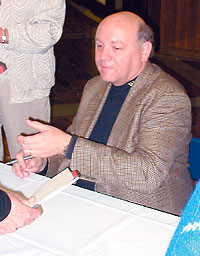Professor warns of religious fanaticism
By Matt Shaw
Published in News on March 31, 2004 2:07 PM
Religious extremists -- Muslims, Christians, even Buddhists -- are making the world a more dangerous place, a Wake Forest University professor told an audience in Goldsboro on Tuesday night.
But it would be wrong to brand all religious people with the actions of fanatics, Dr. Charles Kimball said.

News-Argus/Matt Shaw
Dr. Charles Kimball signs copies of his book, "When Religion Becomes Evil: Five Warning Signs," after his lecture at Wayne Community College on Tuesday night.
"Religion has inspired some of the most dastardly deeds that the world has ever known," he said, "but I believe it is also our best hope."
Greater understanding could help defuse the brewing conflicts around the world, he said. "When you're standing on the edge of a cliff, progress is not defined as a step forward. ... You need to step back and look at where you are."
Kimball, an ordained Baptist minister, has worked extensively both in the Middle East and with public policy makers in Washington, D.C. He now heads Wake Forest University's religions department.
Kimball has been interviewed more than 400 times by media outlets in the wake of the Sept. 11 attacks. That exposure led a book publisher to ask him to write a book about religious fanatics. "When Religion Becomes Evil: Five Warning Signs" was published in September 2002, the first anniversary of the hijackings.
His lecture was arranged by the Foundation of Wayne Community College. Around 120 people attended.
The terrorist attacks in 2001 alerted Americans to tensions that had been brewing for years and decades in other places, Kimball said. We could see that religious fervor is a more powerful force than many of us suspected.
"It doesn't take very many people to wreak havoc on a global scale," he said. Nineteen people turned commercial airlines and box cutters into "weapons of mass destruction."
Many people have reacted by demonizing the Muslims, he said. Jerry Falwell called the Islamic prophet Mohammed a "terrorist" during a "60 Minutes" interview, he noted.
Those types of statements have escalated the dangers faced by Christian missionaries around the world.
People need to understand that "the overwhelming majority of Muslims are like any of us," he said. Their days are preoccupied with getting kids off to school, earning a living, planning birthday parties, and other run-of-the-mill stuff.
Islam comes from the same religious tradition as Judaism and Christianity and shares many of the same teachers, he said. Jesus is mentioned more than 90 times in the Koran, which also refers repeatedly to the Torah and the Gospels.
"Some people say that we don't even worship the same God," Kimball said. But "Allah" is just the Arabic word for God, he continued. Christians living in the Middle East typically would refer to Allah.
Muslims may have a different relationship with God than Christians do, but even people of the same faith have individual, diverse relationships with God. "Take any row in this auditorium, split it up into groups, and you'd be surprised by the differences," he said.
Christians also need to know that millions of Muslims are angry and frustrated by their circumstances, he added. Consider the plight of Iraqis who lived in a country with tremendous resources, yet who couldn't get medicine for their children.
If even an extremely small percentage of the 1.3 billion Muslims could be pushed into extremist behavior, we're still talking about thousands or even tens of thousands of people, he said. "We have no way of estimating, and the stakes are very, very high."
But he pointed out that Timothy McVeigh, who destroyed a federal building in Oklahoma City, was a Christian radical. And there's little difference between a suicide bomber and someone who shoots health-care workers who perform abortions, he added.
Several warning signs can alert observers to when religious beliefs have corrupted into fanaticism, he said.
Look for claims that a religious sect has "the absolute truth" on its side, he said. As religious man, Kimball believes in the concept of "absolute truth," but he doesn't believe that any human could totally understand it, at least not in life, he said.
"None of us possess the mind of God. ... Anyone who claims to have God in his pocket is a disaster waiting to happen," he said.
He reminded the audience that the core of Jesus' teachings was to "love God with all your heart and love your neighbor as yourself." That tenet is at the heart of nearly all the great religions, he said.
